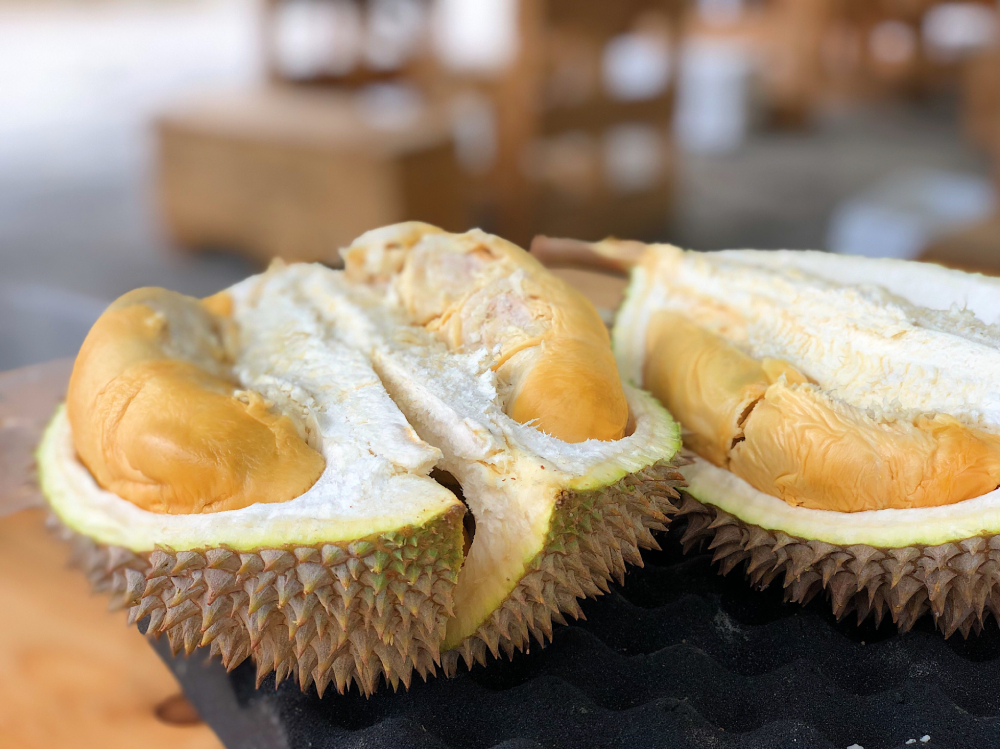Durian safety 101: How to avoid bringing home artificially ripened versions of the king of fruits


 PUBLISHED ONJuly 19, 2021 2:55 AMBYMelissa Teo
PUBLISHED ONJuly 19, 2021 2:55 AMBYMelissa Teo Durian season has left most Singaporeans in a frenzy and some people are even willing to risk their lives for the king of fruits.
But before you start queuing for it or attempting to knock it off a tree, you should check if it's safe for consumption.
Recently, a video circulating on social media warns consumers of artificially ripened durians from Malaysia.
The video caption goes on to claim that some durian dealers use an ethylene-producing yellow paint on their fruits, while others use calcium carbide, an industrial chemical.
If you're unfamiliar with these substances, ethylene is a naturally occurring ripening agent and calcium carbide is a ripener that is illegal in a number of countries due to the occupational safety risks it poses to workers who have direct contact with the chemical.
Based on a hazardous substance fact sheet by the New Jersey Department of Health, calcium carbide can cause skin irritation such as rash, redness and a burning sensation, as well as irritate the mouth, nose and throat.
In even more serious cases, the chemical can even cause severe eye irritation and permanent damage, and fluid build-up in the lungs.
So should durian consumers in Singapore be worried?
It's generally safe to buy durians locally as the Singapore Food Authority (SFA) routinely tests fruit for traces of chemical ripener residue.
Food that fails SFA's routine inspection and food safety tests will not be allowed for sale.
According to SFA's website, durians should be imported from licensed importers. Food sellers should also only obtain their ingredients from SFA-regulated sources.
To be extra cautious during the durian selection process, here are some tips and tricks that you can keep in mind before making a purchase:

According to online durian store Durian Factory, when the fruit falls off a tree, the stem of the ripe durian should break off at a weakened groove called the abscission layer. If not, there is a chance that durian may have been cut off instead.
The colour of the stem matters too. An article by The Washington Post says that fresh durians have stems that are "moist and light in colour" and the older the durian, the "darker and drier" the stems are.
This may sound hard to determine because durians are known for their pungent smell.
However, Durian Factory says that if the fruit smells sour, it's an indicator that it has most likely gone bad.
This is to reduce the chances of you getting a contaminated durian.
Additionally, for whole durians, SFA advises consumers to ensure that the shell is not cracked or open.
Before purchasing your durians — or anything, for that matter — from a seller, consumers should always do a background check to ensure that they are getting the product from a reliable source with a good track record.
To do so, look out for reviews by previous customers. It also helps to ask friends or family for recommendations so you know that these products have been tried and tested by people you can trust.
To avoid inadvertently consuming any potential chemical residue, SFA says that it is important that you wash your hands after handling the durian shell with your bare hands and before eating the durian flesh.
American durian blogger Lindsay Gasik tells The Straits Times that these yellow substances are likely tumeric mixed with ethephon, a common ripening agent.
While food science experts say ethephon can be carcinogenic, Professor William Chen, director of Nanyang Technological University's Food Science & Technology programme, tells the newspaper that the risk is low as the durian husk is typically not eaten.
Nevertheless, if you'd prefer naturally ripened durians, watch out for this.
melissateo@asiaone.com